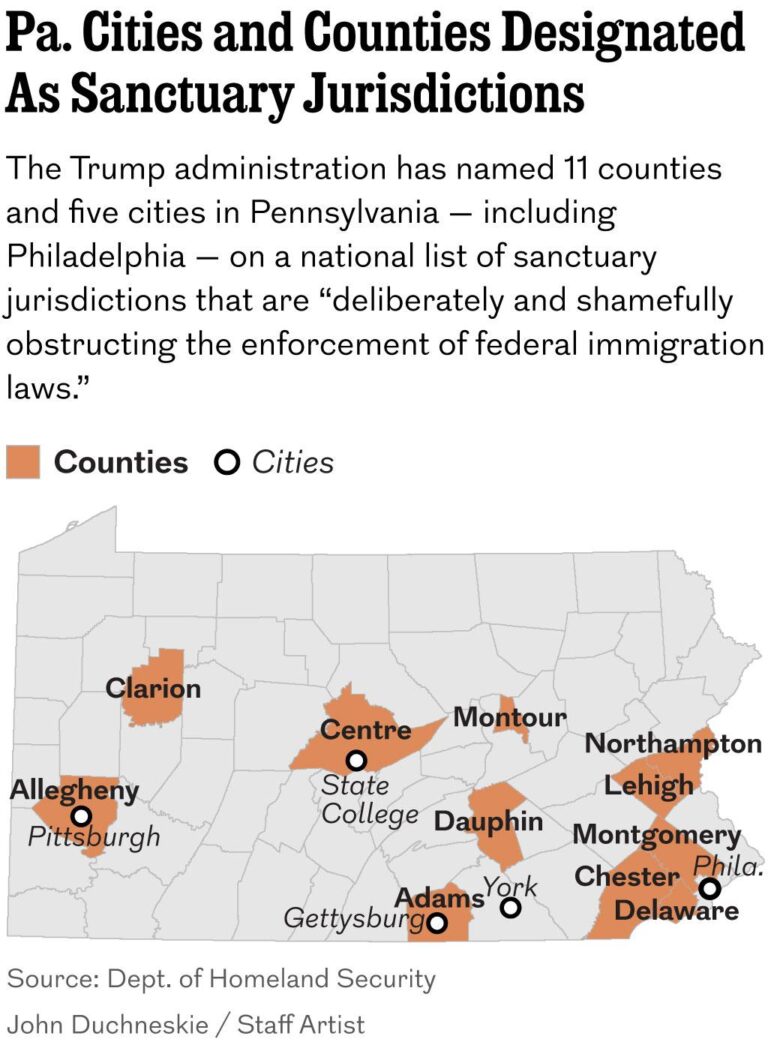Uncertainty Grows After Federal Removal of Sanctuary Jurisdictions List: Implications for Philadelphia and Beyond
Philadelphia and Nationwide Communities Grapple with the Vanishing Sanctuary Jurisdictions List
The recent and unexpected elimination of the federal government’s “sanctuary jurisdictions” list has generated widespread confusion and concern among city officials, immigrant advocates, and residents in Philadelphia and across the United States. This list, which previously identified municipalities that limit cooperation with federal immigration enforcement, served as a vital resource for understanding local immigration policies. Its sudden disappearance has left many questioning the transparency of immigration enforcement and the future dynamics between federal agencies and sanctuary cities.
Without an official registry, local governments face challenges in defining their stance on immigration enforcement, complicating resource planning and public communication. Immigrant communities, meanwhile, are left uncertain about their safety and the reliability of local protections, potentially heightening anxiety and reducing community engagement. Federal authorities also encounter operational difficulties due to the lack of clear benchmarks for collaboration. The table below summarizes the primary concerns voiced by key stakeholders:
| Group | Main Concern | Possible Consequences |
|---|---|---|
| City Officials | Understanding current policy status | Challenges in allocating resources and communicating policies |
| Immigrant Populations | Trust in law enforcement and personal safety | Heightened fear of deportation and decreased civic participation |
| Federal Agencies | Coordinated enforcement efforts | Operational inefficiencies and inconsistent enforcement |
- Philadelphia’s leadership is advocating for a transparent replacement framework to ensure community safety and policy clarity.
- Immigration advocacy organizations demand clear federal communication to avoid further destabilization of immigrant communities.
- Legal analysts caution that the removal may lead to arbitrary enforcement and undermine due process protections.
Legal Perspectives: The Need for Transparency and Consistency in Immigration Policy
Legal experts specializing in immigration law have voiced significant concerns regarding the abrupt withdrawal of the sanctuary jurisdictions list. They argue that this move diminishes transparency, leaving both local governments and immigrant communities without a clear understanding of applicable policies. One immigration attorney remarked, “The absence of a publicly accessible list risks eroding accountability and public trust, which are essential for fair enforcement.”
The removal also contributes to a fragmented regulatory landscape, complicating compliance and enforcement. Key legal challenges include:
- Inconsistent standards and interpretations across different municipalities
- Difficulty for policymakers to assess adherence to federal and state immigration guidelines
- Increased potential for litigation due to ambiguous enforcement practices
In response, some legal professionals advocate for the development of new, transparent frameworks that respect local autonomy while ensuring clear, enforceable policies. Enhanced communication between federal and local entities is seen as critical to achieving this balance.
Community Voices Call for Clear Policies and Open Dialogue
Community leaders in Philadelphia and other impacted regions have expressed frustration over the lack of clarity following the removal of the sanctuary jurisdictions list. They emphasize the urgent need for consistent, transparent communication from government officials to alleviate confusion and protect vulnerable populations. Without clear directives, city officials, advocates, and residents struggle to understand enforcement protocols, available resources, and the implications for local law enforcement.
Advocates highlight several priority areas requiring immediate clarification:
- Law Enforcement Engagement: Guidelines on how local police should interact with federal immigration authorities.
- Access to Community Services: Assurance that immigrants can safely utilize essential services without fear of deportation.
- Legal Protections: Clear definitions of safeguards against unlawful detentions and immigration inquiries.
| Issue | Community Concern | Recommended Action |
|---|---|---|
| Policy Transparency | Mixed messages from officials | Implement a unified communication strategy |
| Enforcement Procedures | Uncertainty about cooperation with ICE | Publish clear, written enforcement guidelines |
| Immigrant Safety | Fear and mistrust within immigrant communities | Launch public education and outreach campaigns |
Strategies to Rebuild Trust: Enhancing Data Transparency and Inclusive Engagement
Restoring confidence in immigration policy requires government agencies to prioritize open access to accurate, up-to-date data. Public availability of enforcement statistics, case outcomes, and policy parameters can counter misinformation and empower communities to make informed decisions. Utilizing interactive dashboards and clear, accessible reports can help demystify complex immigration enforcement processes.
Equally important is fostering meaningful engagement with stakeholders. Authorities should create inclusive platforms for dialogue, inviting input from immigrant communities, advocacy groups, and local officials. Regular town halls, surveys, and collaborative workshops can facilitate mutual understanding and co-creation of effective policies. The following framework outlines key steps for stakeholder involvement:
| Engagement Activity | Description | Intended Outcome |
|---|---|---|
| Community Listening Sessions | Open forums for residents to share concerns and experiences. | Identify misinformation and key community issues. |
| Policy Development Workshops | Collaborative meetings with stakeholders to refine enforcement policies. | Create nuanced, broadly supported guidelines. |
| Ongoing Communication | Regular updates on policy changes and enforcement data. | Maintain transparency and build sustained trust. |
- Ensure clarity: Present information in straightforward, accessible formats.
- Promote inclusivity: Provide safe spaces for open dialogue and feedback.
- Adapt policies: Use community input to continuously improve enforcement practices.
Conclusion: Navigating the Future of Sanctuary Policies Amid Uncertainty
The removal of the sanctuary jurisdictions list has intensified uncertainty in Philadelphia and other cities, raising critical questions about the direction of local immigration policies and federal cooperation. As municipalities seek clarity on the implications of this change, the tension between federal immigration enforcement and local governance remains palpable. Moving forward, transparent communication, legal safeguards, and active community engagement will be essential to shaping equitable and effective sanctuary policies that protect immigrant communities while respecting the rule of law.








